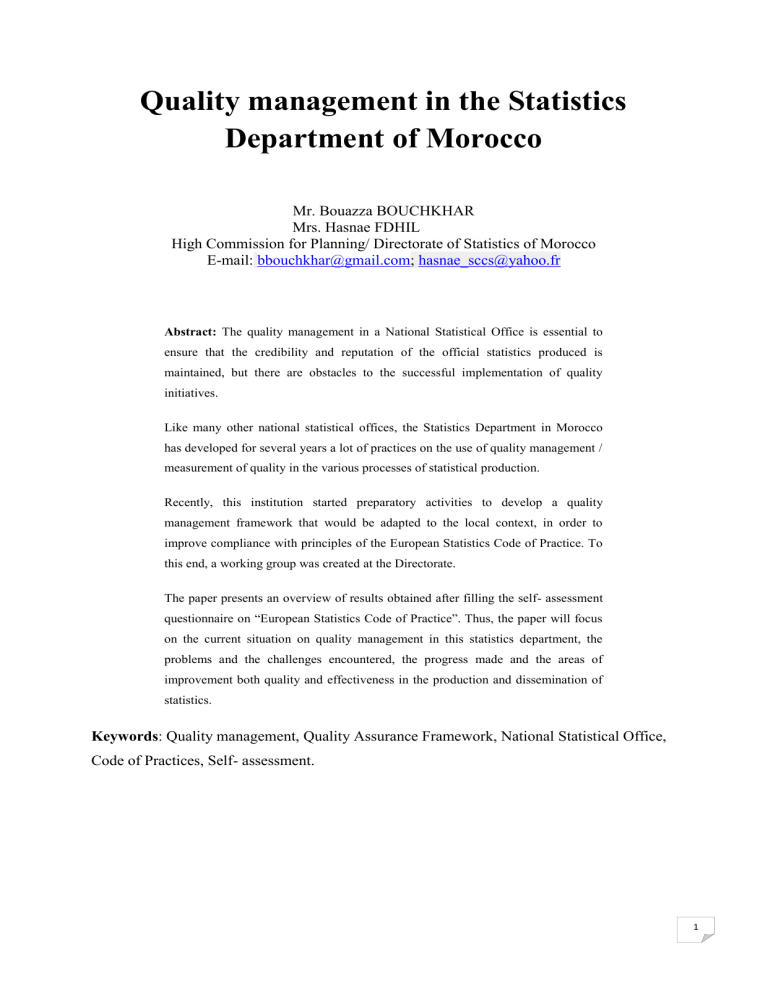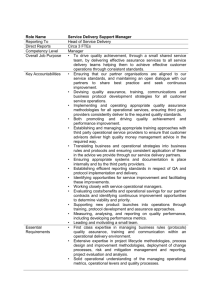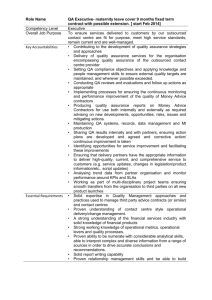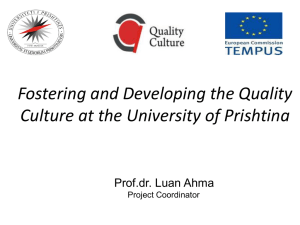Quality management in the Statistics Department of Morocco

Quality management in the Statistics
Department of Morocco
Mr. Bouazza BOUCHKHAR
Mrs. Hasnae FDHIL
High Commission for Planning/ Directorate of Statistics of Morocco
E-mail: bbouchkhar@gmail.com
; hasnae_sccs@yahoo.fr
Abstract: The quality management in a National Statistical Office is essential to ensure that the credibility and reputation of the official statistics produced is maintained, but there are obstacles to the successful implementation of quality initiatives.
Like many other national statistical offices, the Statistics Department in Morocco has developed for several years a lot of practices on the use of quality management / measurement of quality in the various processes of statistical production.
Recently, this institution started preparatory activities to develop a quality management framework that would be adapted to the local context, in order to improve compliance with principles of the European Statistics Code of Practice. To this end, a working group was created at the Directorate.
The paper presents an overview of results obtained after filling the self- assessment questionnaire on “European Statistics Code of Practice”. Thus, the paper will focus on the current situation on quality management in this statistics department, the problems and the challenges encountered, the progress made and the areas of improvement both quality and effectiveness in the production and dissemination of statistics.
Keywords : Quality management, Quality Assurance Framework, National Statistical Office,
Code of Practices, Self- assessment.
1
1.
Introduction
The statistical production process constitutes the core of the activity of a National Statistical
Office. Hence, the objective of a statistician is to give an impartial, diversified and reliable picture of society while respecting the privacy of those whom the data concern.
In parallel, the term quality is interpreted broadly and includes all aspects of how the process and the statistical results meet the expectations of users and stakeholders. And, good quality is not limited to the needs of users, but also requires to take into account the concerns of respondents about the response burden and privacy and to ensure that the institutional context is impartial, objective and that based on a proven methodology and effective methods in terms of costs.
Moreover, the quality management in the National Statistical Office is the set of systems and frameworks which are in place within an organization to manage the quality of statistical products and processes.
2.
The quality management in a National Statistical Office (NSO)
In the case of National Statistical Office, the quality management is essential to ensure that the credibility and reputation of the official statistics produced is maintained, but there are obstacles to the successful implementation of quality initiatives.
Furthermore, it is assumed that a National Quality Assurance Framework (NQAF) is addressed, almost at the same organizational level as the system of quality management described in the well-known series of standards ISO 9000 quality but adapted to the specific context of a NSO.
2.1.
Advantages
The main benefits of having a quality assurance framework in place are:
It provides a systematic mechanism for facilitating the ongoing identification of quality problems and possible actions for their resolution.
It gives greater transparency to the processes by which quality is assured and reinforces the image of the office as a credible provider of good quality statistics.
2
It provides a basis for creating and maintaining a quality culture within the organization and contains reference material that can be helpful for training;
It supports quality improvements and their maintenance over time.
It is a mechanism for the exchange of ideas on quality management within the national statistical system and with other national and international statistical organizations.
2.2.
Challenges
Along with the formulation and implementation of a quality assurance framework come some significant challenges:
It is necessary to set up an effective coordination and communication among all members of the national statistical system.
It is crucial to have a senior management support for a successful implementation of a quality assurance framework.
The concrete and practical results need to be demonstrated rather quickly in order to continue to assure continued support.
Quality has to be considered a core value and needs to become embedded in the culture of the organization.
3.
The Statistics Department of Morocco and the quality
The High Commission for Planning (HCP) is the core of the National Statistical System
(NSS), insofar as it is the main producer of economic, demographic and social statistical data, in addition to its other missions in national accounts and studies in areas of the applied economics.
The field of statistics is governed mainly by the following legislative and regulatory instruments: o Royal Decree Law No. 370-67 August 5, 1968 on the statistical studies. o Decree No. 2-75-463 of 19 August 1975 relating to the duties and the organization of the Secretariat of Planning and Regional Development. o Decree No. 2-02-397 of 17 July 2002 establishing the new organization of the High
Commission for Planning.
In the same context, draft legal texts have been developed by the HCP to update the legal framework laying down the objectives, organization and operating rules of the NSS.
3
In Morocco, practices have been developed over time to improve the quality of statistics by targeting all the production process, from design to dissemination of statistical products. In this respect, the HCP has been engaged for several years in a process of modernization and alignment of its statistical system to international standards. Several actions have been taken in this context, the main concern compliance with international standards of design, collection, exploitation and dissemination, adaptation needs of reliable statistics in a society undergoing profound demographic, environment, social and economic evolution; and the use of more and more new technologies in the production process and dissemination of statistics.
The aim is to produce relevant statistical quality, credible, and accessible at appropriate times to wider audience of users.
4.
Implementation of a quality management framework
Every national statistical office needs to have a national quality assurance framework (NQAF) in place- or consider developing one if they have not yet done so. The objective would be to have in place an overarching framework that would provide context for quality concerns, the various quality procedures and tools.
In parallel, the international statistical community recognizes the importance of quality management as a guarantor of the credibility of official statistics. So, initiatives of international and regional cooperation have been implemented in recent years to raise awareness and assist countries to put in place quality assurance frameworks in their national statistical systems.
Hence, various types of general and internationally developed quality management approaches, systems, models and frameworks exist. And some national statistical offices may apply one or several of these approaches in full or in part, for different purposes or base their own systems on elements from them while making further adaptations according to their specific national circumstances.
The quality approach in which the HCP enrolled involves the establishment of a NQAF of statistics. This regulatory and methodological framework, which is now part of International and European best practices and principles, will sustain the ongoing commitment of HCP at national and international level for the quality of statistics. Referring to International and
European standards and best practices, this NQAF will provide a formalized framework to ensure continued compliance with these standards at every stage of the statistical process:
4
design, collection, processing, analysis, dissemination, storage and evaluation of statistical data in Morocco.
5.
Creating a working group
The lack of a coherent quality assurance framework , which is established and documented process measurement and quality control on a regular basis , remains one of the axes to be developed in the pursuit of making level of the national statistical system.
The best way to lead the process of developing a NQAF is the establishment of a working group within the national statistical office, made up of an experienced team of staff from a variety of areas: programme planning, survey design, survey operations, distribution, infrastructure development and support.
In this context, an internal working group across the HCP was set up to ensure the progressive implementation of a quality assurance framework that is adapted to the local context and proceed to its implemented.
The main objectives of the establishment of the working group are the following:
Implement quality processes.
Promoting quality culture within the HCP.
Undertake the necessary work to improve the quality of statistics produced and disseminated by the HCP.
Provide guidelines, standards and methodological aids for quality work in various production processes of statistical data.
Coordinate and supervise the activities to assess the quality of statistics at the HCP.
Be active in the activities of the Euro-Mediterranean working groups on quality.
File the Self- assessment questionnaire on the implementation of the European
Statistics Code of Practice within ENP- South statistical offices. And,
Establish a coherent national assurance quality framework and covering the various aspects of statistical work.
6.
Self- assessment questionnaire on European Code of Practices
It is a Self- Assessment Questionnaire on the implementation of the European Statistics Code of Practices within ENP- South statistical offices. This questionnaire follows the structure of
5
the European Statistics Code of Practice. It is subdivided into 15 principles and the 3 to 9 indicators for each of the principles.
The main goal of the use of this self- assessment was to evaluate the compliance of the
Statistics Department of Morocco with selected principles of the European Code of Practices, in order to pint the current situation and the challenges. At the same time it serves to identify at national level areas for further development and improvement, thus providing the basis for national Code of Practice improvement plans.
After filling the self- assessment questionnaire on “European Statistics Code of Practice” the results obtained concerned the current situation on quality management in this statistics department of Morocco, the challenges encountered or important elements to consider and the areas of improvement.
6.1.
Current situation
The following table gives an overview on the current status which describes the situation about the implementation (yes or no) of each principle and each indicator in Morocco.
Number of indicators
Principles
1Professional independence
2Mandate for data collection
3Adequacy of resources
4Commitment to quality
5Statistical confidentiality
6Impartiality and objectivity
7Sound methodology
8Appropriate statistical procedures
9Non- excessive burden on respondents
10Cost effectiveness
11Relevance
12Accuracy and reliability
13Timeliness and punctuality
14Coherence and comparability
15Accessibility and clarity
Total
6
3
5
4
3
5
7
82
8
7
4
6
9
8
3
4
5
3
2
3
2
4
2
64
7
6
3
5
9
Current status
Yes No
7
3
3
1
0
1
1
1
1
1
0
1
0
3
1
1
1
5
18
6
According to the table above, we can see that 64 indicators (78%) were accepted and implemented at
HCP in Morocco. Otherwise, only 18 indicators (22%) are not applicable.
6.2.
Important elements/ challenges
The most important elements/challenges are presented for each principle as follows:
Principle 1: Professional Independence .
The issue of professional independence and the two indicators related to it seem to be the most difficult and controversial ones.
Coordination between the NSO and the others statistical authorities has to be strengthened.
It is important to highlight the role of the NSO in the NSS (label, control, coordinator...).
Professional independence must cover the whole process of the preparation of statistics, including the decisions on concepts and terminology.
Principle 2: Mandate for data collection
The focus should be on implementation, and more specifically on how to get access do administrative data sources.
It is important to highlight the role of the NSO for collecting data produced by the others ministerial structures.
Principle 3: Adequacy of resources
The sustainability of resources needs to be ensured.
The independence of the NSO in the use of its resources needs to be ensured.
The challenge is to use efficiency the resources and to prepare seriously the replacement of the experts to be retired in the next years.
Principle 4: Commitment to quality
The main issue of implementing this principle is the introduction of a quality culture in the
NSO.
User- producer dialogue is important.
There is a need to provide forums/means to obtain users’ and non- users’ views on quality.
The role played by the NSO in the national system can introduce system- wide quality standards.
Principle 5: Statistical confidentiality
7
Its strict application is not yet assured, in particular for signing a statement of confidentially by all staff.
It is necessary to assure the conformity with a national law for the protection of personal data.
Under the condition that it is solely for statistical purposes and that confidentiality is ensured and covered by law, progress needs to be made in data sharing within the national statistical system. For that, it is necessary to clarify the questions of ownership and responsibility.
Principle 6: Impartiality and objectivity
Dissemination of data to the general public will need to be enhanced ensuring at the same time that pre- release access to data under embargo is limited.
Publishing a calendar of publication.
Several good practices were identified relating to the establishment of statistical culture, for example, through specific training provided for schools.
Principle 7: Sound methodology
It is important to accomplish a full harmonization with European and international standards.
Prepare quality guidelines, statistical glossaries, and methodological manuals and recommended practices handbooks.
Create a specific unit to enhance the application of the standard concepts, definitions and classifications.
Principle 8: Appropriate statistical procedures
The use of administrative records should be evaluated regularly to guarantee high quality of statistical outputs.
Documenting the process used for development, collection, compilation and production of statistics; and regularly reviewing it to assess their efficiency and effectiveness.
Principle 9: Non- excessive burden on respondents
It is important that the statistical authorities monitor the response burden and set targets for its reduction.
Assessment of the needs for collecting the information.
Developing the use of administrative data for statistical purposes.
Principle 10: Cost effectiveness
8
Documenting the costs of producing the statistics at each stage of statistics production. The objective is to assess their effectiveness.
Assess the cost- effectiveness of every statistical survey or other statistical process.
Principle 11: Relevance
Measuring user satisfaction regularly and following up systematically.
Principle 12: Accuracy and reliability
Setting up a quality assurance plan that describes the quality control actions to prevent, monitor and evaluate non- sampling errors.
Principle 13: Timeliness and punctuality
It is important to establish a calendar of data dissemination and to publish any divergence.
Principle 14: Coherence and comparability
Setting up procedures and guidelines to ensure and to monitor internal coherence.
Principle 15: Accessibility and clarity
Elaboration of the metadata of all indicators to be published on line with the methodologies and the questionnaires used.
Publishing quality reports of all surveys.
6.3.
Prospects
The self-assessment consisted of an evaluation of the relevant statistics vs. the principles and indicators of the European Code of Practice. It constitutes a basis for the next steps with mapping user needs and reviewing the production processes. . It is also a strong statement from an NSO to provide high quality data to users. Its application should help improving credibility on national level and might serve as reference for national discussions. It can even lead to the development of a national Code of Practices. It is a dynamic and flexible tool that allows NSOs to monitor their own development in the implementation of quality assurance frameworks and the overall quality management.
Also, during the development and implementation of quality assurance framework, we can expect that the staff will have to become more aware of different quality concepts, instruments, policies and best practices and improving the related documentation, to acquire
9
knowledge by having made or participated in a systematic quality assessment (e.g., selfassessment, peer assessment and / or verification of quality), to identify various potential quality problems and actions and priorities for improvements made.
7.
Conclusion
The establishment of a NQAF fits perfectly with the dynamic in which the HCP is committed in developing statistics in Morocco; and allows supervision and standardization of processes and tools needed to manage the systematic evaluation and continuous improvement of data quality and process of production and dissemination of statistics by the HCP or by the other stakeholders of SSN that could well join.
References
[1] Statistics Finland (2007), Quality Guidelines for Official Statistics, 2nd Revised Edition,
Helsinki – Helsingfors.
[2] Mary Jane Holupka (2013), National Quality Assurance Frameworks, United Nations
Statistics Division.
[3] UNECE Secretariat (2009), Generic Statistical Business Model, Version4.0- April 2009.
[4] The Expert Group on National Quality Assurance Frameworks (2012), Guidelines for the
Template for a Generic National Quality Assurance Framework (NQAF), Statistical
Commission- United Nations ( Forty- third session).
[5] Eurostat (2010), ESS Quality Glossary 2010.
[6] Eurosat (2014), Self- Assessment Questionnaire on the implementation of the European
Code of Practice within ENP- South statistical offices.
[7] Eurosat (2007), Handbook on Data Quality Assessment Methods and Tools- Assessment
Methods and Tools (DatQAM).
[8] Eurosat (2005), European Statistics Code of Practices.
[9] Economic Commission for Latin America and the Caribbean (2009), Report on the development
In statistics in Latin America and the Caribbean.
[10] Economic Commission for Latin America and the Caribbean (2011), Code of Good
Practice in statistics in for Latin America and the Caribbean.
10







